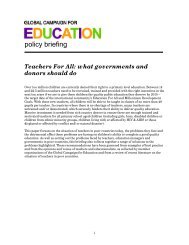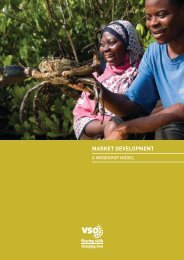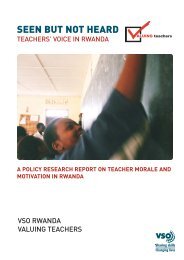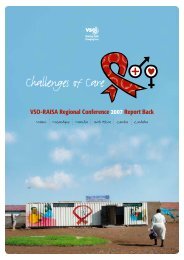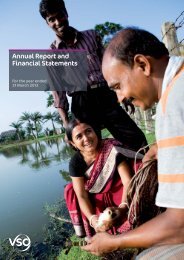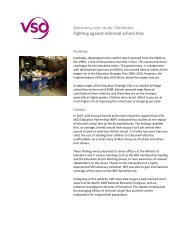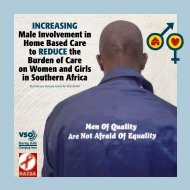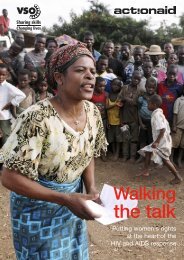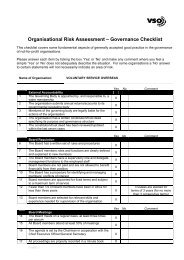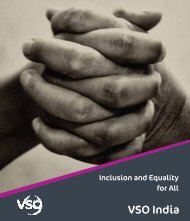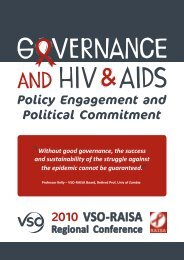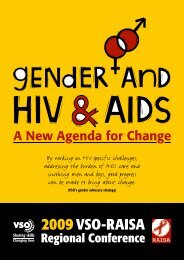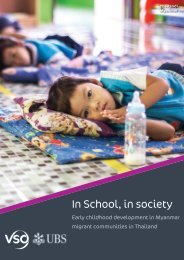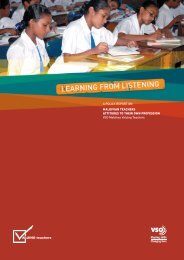Teachers' Voice â Nigeria - VSO
Teachers' Voice â Nigeria - VSO
Teachers' Voice â Nigeria - VSO
- No tags were found...
You also want an ePaper? Increase the reach of your titles
YUMPU automatically turns print PDFs into web optimized ePapers that Google loves.
1.1 PURPOSE OF THE RESEARCH INTO TEACHERS’MOTIVATION IN NIGERIAThe motivation level of teachers is a significant factor in influencing the delivery of qualityeducation. It significantly affects attainment of learning outcomes in classrooms internationally.It determines the school environment; the quantity and quality of knowledge children receive;the level of skills to enhance the development of young minds; and the sense of security childrenfeel. The purpose of this research project is to:• discover <strong>Nigeria</strong>n teachers’ perception of their profession – what motivates them, what factorsaffect their esteem and what would contribute to a boost in their spirits• uncover how other key educational stakeholders view education in <strong>Nigeria</strong> today and what theyperceive motivates teachers• support the dual efforts of government and other agencies in <strong>Nigeria</strong> to improve the quality andparticipation in education.1.2 RESEARCH METHODOLOGYThe Valuing Teachers research project is a qualitative exploration to assemble teachers’ feelingsand views about their profession. The research process, therefore, involved a number of differentqualitative methods of gathering data to obtain the findings of this report. These include focusgroup discussions, interviews, questionnaires, desk research and Theatre for Development (TFD)techniques (Theatre for Development is a method using drama as a tool to look deeper at thecauses and solutions of a problem in a community or organisation). The desk research wascarried out before and after the field research. A number of key education stakeholders wereinvolved in the development of the terms and reference of the research and they supported thelaunch of the research.<strong>VSO</strong> selected <strong>VSO</strong> volunteers across <strong>Nigeria</strong> for the Valuing Teachers research project on thebasis of where they, and <strong>VSO</strong> resources, were situated. Participants were then invited forinterviews with the local and state education boards, prior to the arrival of the research team.<strong>VSO</strong> Volunteers aided the facilitation of interviews and focus group discussions, and wrote uptheir findings.The research team, including <strong>VSO</strong> volunteers, representatives of CSACEFA and members of theCentre for Research and Documentation (CRD), conducted 36 focus group discussions in 10states of <strong>Nigeria</strong> – Nassarawa, Federal Capital Territory, Kaduna, Enugu, Gombe, Kebbi, Niger,Osun, Plateau and Kano – and held two community TFD workshops in Baylelsa and Akwa Ibomstates, representing the six geopolitical zones (below). The participants in the focus groupdiscussions were primary and lower secondary school teachers of public, private, nomadicand special needs schools. They provided a base of quantitative data for research. The researchteams grouped participants according to gender and held the discussions separately witheach group.The research teams held numerous interviews with key stakeholders in the <strong>Nigeria</strong>n educationsector: head teachers; LGEA and SUBEB representatives; confederates of the NUT,parent–teacher associations, Teachers Registration Council <strong>Nigeria</strong>, the NCCE, educationofficials, and education specialists. These stakeholders divulged crucial insights into <strong>Nigeria</strong>neducational policies.As part of the research <strong>VSO</strong> <strong>Nigeria</strong> examined and evaluated the current views and opinionsexpressed by individuals, aid agencies and the FME on <strong>Nigeria</strong>n education (EFA (<strong>Nigeria</strong>), 2006:5). It has enriched our perspective and enforced our awareness of the recognition of all partiesconcerned that change is vital for <strong>Nigeria</strong>’s education system to benefit the children and youth.Teachers and head teachers validated the information used in this report during the focus groupdiscussions and interviews, while key stakeholders partook in a one day validation process,where they examined the key issues raised by the teachers in this report. The stakeholders wereinvited to read the report and give feedback on its validity. Through this process this report wascorroborated.10



